20 Nov 2017 | News and features, Turkey, Turkey Uncensored
[vc_row][vc_column][vc_column_text]
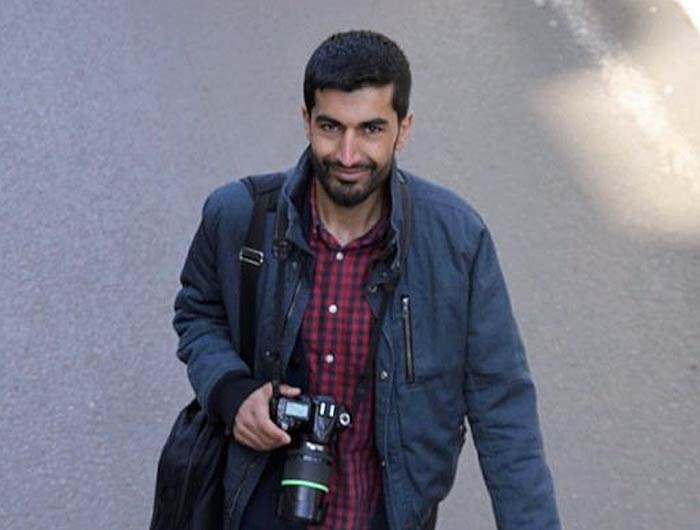
Nedim Türfent has been under detention for more than 18 months. The 5th hearing of his trial will be heard on Dec. 15 at the Hakkari Courthouse. © Mezopotamya Agency
“If we wanted to do, we could kill you right here and then say you were killed during the incidents. No one would be able to prove otherwise.”
That’s what police officers told journalist Nedim Türfent when they arrested him more than 18 months ago.
During the fourth hearing in his trial in the southeastern province of Hakkari on Friday 17 Nov, Türfent, a local correspondent and English news editor for the Dicle News Agency, informed the court about the abusive treatment he had suffered at the hands of authorities. The case had already attracted attention after 19 of 20 witnesses confessed to testifying against Türfent under torture and duress.
Türfent’s description of overt police threats has added more insult to injury in a case that lacks any evidence other than fallacious testimonies. “Don’t worry, we’re going to prepare such a file on you that you’ll be in for at least 20 years. You won’t be getting out anytime soon,” Türfent quoted police as saying during his hearing. The journalist faces up to 22.5 years in prison on charges of “membership in a terrorist organisation” and “conducting propaganda.” His 18 months in detention could be extended further in the next hearing on 15 Dec.
The fierce crackdown on Turkey’s mainstream media has been covered widely. But this has also created a certain “butterfly effect.” As the government dares to imprison renowned journalists in the “west” – Istanbul – the knock-on effect is much greater for Kurdish journalists in the east as they are sent back in time to face the dark spectres of the 1990s: intimidation, death threats, detentions and ill-treatment. The retaliation against Türfent for his journalistic work in his hometown of Yüksekova is one compelling example.
Yüksekova – Gever to the Kurdish locals – sits on a small flat plain that is surrounded by majestic and jagged peaks that pierce the sky. Located in Hakkari, which borders Iraq and Iran, it is the largest urban area in the country’s deprived southeastern corner. Toughened by the landscape, people from Gever are known to be self-resilient, proud and stubbornly uncompromising against any type of pressure – be it extreme weather or government crackdown. The same can be said for Türfent’s journalism. His bold coverage of the military siege and crackdown in the town in March-April 2016 made him a target.[/vc_column_text][/vc_column][/vc_row][vc_row][vc_column][vc_video link=”https://www.youtube.com/watch?v=Yu5HL0b2GwE”][/vc_column][/vc_row][vc_row][vc_column][vc_column_text]One of Türfent’s stories received country-wide media attention when it revealed footage of a commander of special forces inflicting ill-treatment on a group of detainees. “You will see the power of the Turk,” the commander shouted. The story made a tremendous impact, with the prime ministry announcing that it would open a probe over the images.
But then came the death threats, harassment and, eventually, detention for the journalist who broke the story.
“Nedim is being punished for relating the state oppression in Yüksekova during the curfews,” said Nimet Ölmez, a fellow reporter with Mezopotamya Agency, the latest iteration of Dicle News Agency after it and its successor, Dihaber, were closed by decree. “Nedim didn’t have a weapon, a stick or a stone in his hands. All he had was a camera and a pen.”
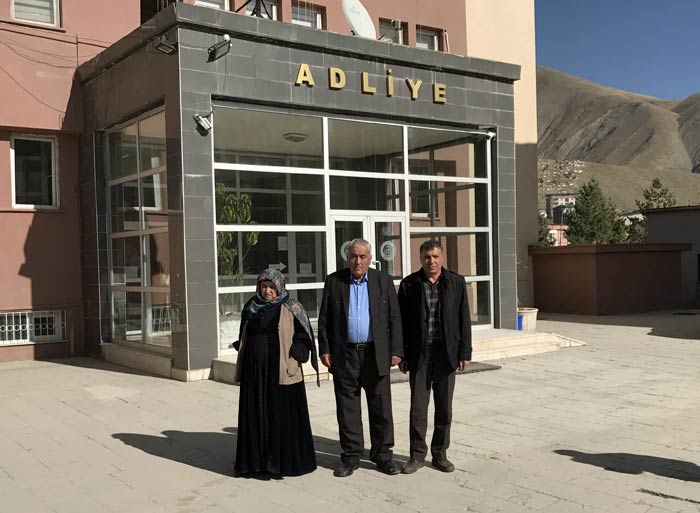
Nedim Türfent’s parents and Diyarbakır-based Free Journalist Society co-chair Hakkı Boltan (R) pose at the Hakkari Courthouse during the fourth hearing of the trial on Nov. 17, 2017 in Hakkari, Turkey. © Özgün Özçer
Fethi Balaman, who started covering the news in Yüksekova for Mezopotamya months after Türfent was detained, explained how his colleague’s work kept the authorities under scrutiny.
“He had a huge network and he could reach anywhere. That scared them. This is why he started to receive more and more threats,” he said. “For instance, they knew that if there was a raid somewhere, Nedim would be informed. What did they do then? They took him so they could do anything they wanted.”
Türfent, who answered our questions from prison through a lawyer, Deniz Yıldız, stressed that it was not just himself but all journalists in the region who were being subject to pressure – pressure that continues even in jail. “As journalists who work in the region, we continuously encounter the cold face of the state when we are outside of prison. The same practices are also reflected once inside.”
More than 200 ongoing cases
Indeed, though compelling, Türfent’s case is just one of many lawsuits against Kurdish journalists. More than 200 probes have been opened against regional journalists, according to Diyarbakır-based Free Journalist Society co-chair Hakkı Boltan.
One of them is Dihaber reporter Selman Keleş, who was detained for taking pictures of Van’s Municipality building after it was surrounded with concrete blocks. Dihaber reporter Mehmet Güleş was also recently sentenced to nine years for “being a member of a terrorist organization” and “conducting propaganda.” Güleş had irritated authorities by reporting about the army’s destruction of homes in his hometown of Şırnak.
Balaman explained that he sometimes has to pass three checkpoints to cover a routine news story. Reporters cannot use a camera anymore, as police and soldiers confiscate them whenever they see one. “When I use a camera, I think about protecting it before protecting myself.”
Türfent is asking for more public awareness and support for the many Kurdish journalists who work across the region. “Our colleagues in the west are confronted with trumped-up indictments. But they have the possibility of moulding public opinion. Journalists who work [here], especially in remote places such as Yüksekova and Cizre, remain in the background.”
The fate of such journalists is a litmus test for defenders of press freedom given the lack of public attention for their plight. “Many colleagues are still waiting for a trial to start two years [after they were detained]. However, there isn’t even a small news story about them,” Türfent said.
Through months of military siege and a state of emergency, local reporters have braved authorities to report on killings, destruction and atrocities that would have been concealed if not for the journalists’ work. But ultimately, the question goes beyond freedom of expression; now, it is the very essence of truth that is at stake.
“Understanding the causes and the results of the Nedim Türfent case means understanding the necessity of freedom for journalists,” said Boltan, demanding more support for Kurdish journalists. “The violations committed here are the source of the pressure on the mainstream media.”
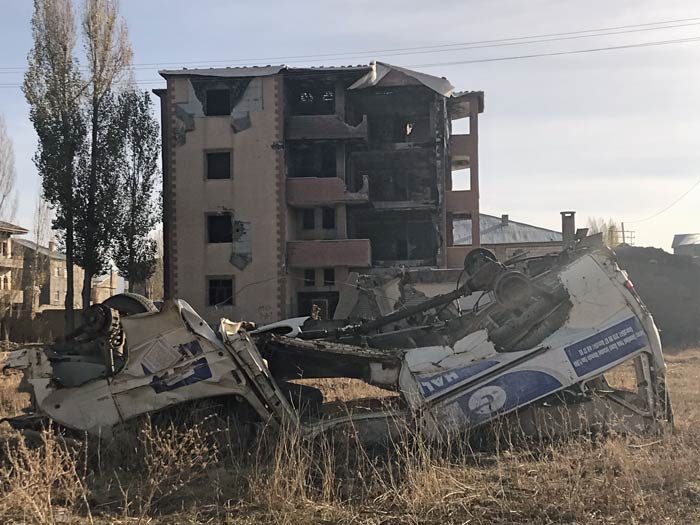
Destruction is still visible in some areas of Yüksekova more than a-year-and-a-half after the military siege. © Özgün Özçer
[/vc_column_text][/vc_column][/vc_row][vc_row][vc_column][vc_custom_heading text=”Mapping Media Freedom” use_theme_fonts=”yes”][vc_separator color=”black”][vc_row_inner][vc_column_inner width=”1/4″][vc_icon icon_fontawesome=”fa fa-times-circle” color=”black” background_style=”rounded” size=”xl” align=”right”][/vc_column_inner][vc_column_inner width=”3/4″][vc_column_text]
Since 24 May 2014, Mapping Media Freedom’s team of correspondents and partners have recorded and verified over 3,600 violations against journalists and media outlets.
Index campaigns to protect journalists and media freedom. You can help us by submitting reports to Mapping Media Freedom.[/vc_column_text][/vc_column_inner][/vc_row_inner][vc_separator color=”black”][/vc_column][/vc_row][vc_row][vc_column][vc_custom_heading text=”Don’t lose your voice. Stay informed.” use_theme_fonts=”yes”][vc_separator color=”black”][vc_row_inner][vc_column_inner width=”1/2″][vc_column_text]Index on Censorship is a nonprofit that campaigns for and defends free expression worldwide. We publish work by censored writers and artists, promote debate, and monitor threats to free speech. We believe that everyone should be free to express themselves without fear of harm or persecution – no matter what their views.
Join our mailing list (or follow us on Twitter or Facebook) and we’ll send you our weekly newsletter about our activities defending free speech. We won’t share your personal information with anyone outside Index.[/vc_column_text][/vc_column_inner][vc_column_inner width=”1/2″][gravityform id=”20″ title=”false” description=”false” ajax=”false”][/vc_column_inner][/vc_row_inner][vc_separator color=”black”][/vc_column][/vc_row]
9 Nov 2017 | Awards, Awards year slider
[vc_row full_width=”stretch_row_content_no_spaces” css_animation=”fadeIn” css=”.vc_custom_1500380806420{padding-top: 250px !important;padding-bottom: 250px !important;background-image: url(https://www.indexoncensorship.org/wp-content/uploads/2017/07/logo-2018-1460×490.jpg?id=94317) !important;background-position: center !important;background-repeat: no-repeat !important;background-size: cover !important;}”][vc_column][/vc_column][/vc_row][vc_row full_width=”stretch_row” css=”.vc_custom_1500449679881{margin-top: -50px !important;}”][vc_column][vc_custom_heading text=”2018 FREEDOM OF EXPRESSION AWARDS” font_container=”tag:h1|text_align:center” use_theme_fonts=”yes”][vc_row_inner disable_element=”yes”][vc_column_inner][vc_empty_space height=”15px”][vc_custom_heading text=”ABOUT THE AWARDS” font_container=”tag:h2|text_align:center” use_theme_fonts=”yes”][/vc_column_inner][/vc_row_inner][vc_row_inner equal_height=”yes” content_placement=”middle”][vc_column_inner el_class=”awards-inside-desc” width=”1/2″][vc_column_text]Index on Censorship’s Freedom of Expression Awards exist to celebrate individuals or groups who have had a significant impact fighting censorship anywhere in the world.
- Awards are offered in four categories: Arts, Campaigning, Digital Activism and Journalism
- Anyone who has had a demonstrable impact in tackling censorship is eligible
- Winners are honoured at a gala celebration in London
- Winners join Index’s Awards Fellowship programme and receive dedicated training and support
[/vc_column_text][/vc_column_inner][vc_column_inner width=”1/2″][vc_video link=”https://youtu.be/a9Yl-nkwpig”][/vc_column_inner][/vc_row_inner][/vc_column][/vc_row][vc_row full_width=”stretch_row”][vc_column][vc_custom_heading text=”2018 Fellowship” font_container=”tag:h3|text_align:center” use_theme_fonts=”yes”][vc_column_text]
Selected from over 400 public nominations and a shortlist of 16, the 2018 Freedom of Expression Awards Fellows exemplify courage in the face of censorship. Learn more about the fellowship.
[/vc_column_text][vc_row_inner][vc_column_inner width=”1/2″][vc_single_image image=”97994″ img_size=”full”][vc_column_text]Arts | The Museum of Dissidence
The Museum of Dissidence is a public art project and website celebrating dissent in Cuba. Set up in 2016 by acclaimed artist Luis Manuel Otero Alcántara and curator Yanelys Nuñez Leyva, their aim is to reclaim the word “dissident” and give it a positive meaning in Cuba. The museum organises radical public art projects and installations, concentrated in the poorer districts of Havana. Their fearlessness in opening dialogues and inhabiting public space has led to fierce repercussions: Nuñez was sacked from her job and Otero arrested and threatened with prison for being a “counter-revolutionary.” Despite this, they persist in challenging Cuba’s restrictions on expression.
Full profile | Speech[/vc_column_text][/vc_column_inner][vc_column_inner width=”1/2″][vc_single_image image=”97988″ img_size=”full”][vc_column_text]Campaigning | Egyptian Commission for Rights and Freedoms
The Egyptian Commission for Rights and Freedoms is one of the few human rights organisations still operating in a country which has waged an orchestrated campaign against independent civil society groups. Egypt is becoming increasingly hostile to dissent, but ECRF continues to provide advocacy, legal support and campaign coordination, drawing attention to the many ongoing human rights abuses under the autocratic rule of President Abdel Fattah-el-Sisi. Their work has seen them subject to state harassment, their headquarters have been raided and staff members arrested. ECRF are committed to carrying on with their work regardless of the challenges.
Full profile | Speech[/vc_column_text][/vc_column_inner][/vc_row_inner][vc_row_inner][vc_column_inner width=”1/2″][vc_single_image image=”97990″ img_size=”full”][vc_column_text]Digital Activism | Habari RDC
Launched in 2016, Habari RDC is a collective of more than 100 young Congolese bloggers and web activists, who use Facebook, Twitter and YouTube to give voice to the opinions of young people from all over the Democratic Republic of Congo. Their site posts stories and cartoons about politics, but it also covers football, the arts and subjects such as domestic violence, child exploitation, the female orgasm and sexual harassment at work. Habari RDC offers a distinctive collection of funny, angry and modern Congolese voices, who are demanding to be heard.
Full profile | Speech[/vc_column_text][/vc_column_inner][vc_column_inner width=”1/2″][vc_single_image image=”98000″ img_size=”full”][vc_column_text]Journalism | Wendy Funes
Wendy Funes is an investigative journalist from Honduras who regularly risks her life for her right to report on what is happening in the country, an extremely harsh environment for reporters. Two journalists were murdered in 2017 and her father and friends are among those who have met violent deaths in the country – killings for which no one has ever been brought to justice. Funes meets these challenges with creativity and determination. For one article she had her own death certificate issued to highlight corruption. Funes also writes about violence against women, a huge problem in Honduras where one woman is killed every 16 hours.
Full profile | Speech[/vc_column_text][/vc_column_inner][/vc_row_inner][awards_gallery_slider name=”2018 AWARDS GALA” images_url=”99875,99880,99879,99881,99882,99884,99885,99886,99887,99888,99889,99890,99891,99892,99893,99902,99906,99907,99908,99909,99910,99911,99912,99913,99914,99915,99916,99917,99918,99919,99920,99921,99922,99923,99924,99926,99925″][vc_column_text]
The Awards were held at London’s May Fair Hotel on Thursday 19 April 2018.
High-resolution images are available for download via Flickr.
[/vc_column_text][vc_custom_heading text=”THE 2018 FELLOWSHIP SHORTLIST” font_container=”tag:h2|text_align:center” use_theme_fonts=”yes”][vc_tta_tabs][vc_tta_section title=”Arts” tab_id=”Arts”][vc_row_inner][vc_column_inner width=”1/2″][vc_column_text]
ARTS
for artists and arts producers whose work challenges repression and injustice and celebrates artistic free expression
[/vc_column_text][/vc_column_inner][vc_column_inner width=”1/2″][vc_video link=”https://www.youtube.com/watch?v=VfntVe_SrPY”][/vc_column_inner][/vc_row_inner][vc_row_inner][vc_column_inner width=”1/4″][vc_single_image image=”97991″ onclick=”custom_link” link=”https://www.indexoncensorship.org/2018/03/indexawards-2018-jamal-alis-music-fights-oppression-in-azerbaijan/”][vc_column_text]Jamal Ali, Azerbaijan[/vc_column_text][/vc_column_inner][vc_column_inner width=”1/4″][vc_single_image image=”97998″ onclick=”custom_link” link=”https://www.indexoncensorship.org/2018/03/index-awards-silvanos-mudzvova/”][vc_column_text]Silvanos Mudzvova, Zimbabwe[/vc_column_text][/vc_column_inner][vc_column_inner width=”1/4″][vc_single_image image=”99853″ onclick=”custom_link” link=”https://www.indexoncensorship.org/2018/03/indexawards2017-museum-of-dissidence-cuba-activism/”][vc_column_text]The Museum of Dissidence, Cuba[/vc_column_text][/vc_column_inner][vc_column_inner width=”1/4″][vc_single_image image=”97985″ onclick=”custom_link” link=”https://www.indexoncensorship.org/2018/03/index-awards-abbad-yahya/”][vc_column_text]Abbad Yahya, Palestine[/vc_column_text][/vc_column_inner][/vc_row_inner][/vc_tta_section][vc_tta_section title=”Campaigning” tab_id=”1524476396272-7b8a9fcb-bce7″][vc_row_inner][vc_column_inner width=”1/2″][vc_column_text]
CAMPAIGNING
for activists and campaigners who have had a marked impact in fighting censorship and promoting freedom of expression
Supported by Doughty Street Chambers
[/vc_column_text][/vc_column_inner][vc_column_inner width=”1/2″][vc_video link=”https://www.youtube.com/watch?v=iV2qFGmPhUU”][/vc_column_inner][/vc_row_inner][vc_row_inner][vc_column_inner width=”1/4″][vc_single_image image=”99421″ onclick=”custom_link” link=”https://www.indexoncensorship.org/2018/03/indexawards2018-ecrf-advocates-for-democratic-egypt/”][vc_column_text]Egyptian Commission for Rights and Freedoms, Egypt[/vc_column_text][/vc_column_inner][vc_column_inner width=”1/4″][vc_single_image image=”97995″ onclick=”custom_link” link=”https://www.indexoncensorship.org/2018/03/index-awards-nglhrc/”][vc_column_text]National Gay and Lesbian Human Rights Commission, Kenya[/vc_column_text][/vc_column_inner][vc_column_inner width=”1/4″][vc_single_image image=”97997″ onclick=”custom_link” link=”https://www.indexoncensorship.org/2018/03/index-awards-open-stadiums/”][vc_column_text]Open Stadiums, Iran[/vc_column_text][/vc_column_inner][vc_column_inner width=”1/4″][vc_single_image image=”97999″ onclick=”custom_link” link=”https://www.indexoncensorship.org/2018/03/index-awards-team-29/”][vc_column_text]Team 29, Russia[/vc_column_text][/vc_column_inner][/vc_row_inner][/vc_tta_section][vc_tta_section title=”Digital activism” tab_id=”1524476516614-1a2ebb46-7ed2″][vc_row_inner][vc_column_inner width=”1/2″][vc_column_text]
DIGITAL ACTIVISM
for innovative uses of technology to circumvent censorship and enable free and independent exchange of information
Supported by Private Internet Access
[/vc_column_text][/vc_column_inner][vc_column_inner width=”1/2″][vc_video link=”https://www.youtube.com/watch?v=dz0rqQOlutw”][/vc_column_inner][/vc_row_inner][vc_row_inner][vc_column_inner width=”1/4″][vc_single_image image=”97987″ onclick=”custom_link” link=”https://www.indexoncensorship.org/2018/04/index-awards-digital-rights-foundation/”][vc_column_text]Digital Rights Foundation, Pakistan[/vc_column_text][/vc_column_inner][vc_column_inner width=”1/4″][vc_single_image image=”97989″ onclick=”custom_link” link=”https://www.indexoncensorship.org/2018/04/index-awards-fereshteh-forough/”][vc_column_text]Fereshteh Forough, Afghanistan[/vc_column_text][/vc_column_inner][vc_column_inner width=”1/4″][vc_single_image image=”99851″ onclick=”custom_link” link=”https://www.indexoncensorship.org/2018/04/index-awards-habari-rdc-digital-activism/”][vc_column_text]Habari RDC, Congo[/vc_column_text][/vc_column_inner][vc_column_inner width=”1/4″][vc_single_image image=”97992″ onclick=”custom_link” link=”https://www.indexoncensorship.org/2018/04/index-awards-media-cat-free-speech/”][vc_column_text]Mèdia.cat, Spain[/vc_column_text][/vc_column_inner][/vc_row_inner][/vc_tta_section][vc_tta_section title=”Journalism” tab_id=”1524476563543-4fdf3da9-962c”][vc_row_inner][vc_column_inner width=”1/2″][vc_column_text]
JOURNALISM
for courageous, high-impact and determined journalism that exposes censorship and threats to free expression
Sponsored by Vice News
[/vc_column_text][/vc_column_inner][vc_column_inner width=”1/2″][vc_video link=”https://www.youtube.com/watch?v=i8KfzAtARGQ”][/vc_column_inner][/vc_row_inner][vc_row_inner][vc_column_inner width=”1/4″][vc_single_image image=”97986″ onclick=”custom_link” link=”https://www.indexoncensorship.org/2018/04/index-awards-avispa-midia/”][vc_column_text]Avispa Midia, Mexico[/vc_column_text][/vc_column_inner][vc_column_inner width=”1/4″][vc_single_image image=”99850″ onclick=”custom_link” link=”https://www.indexoncensorship.org/2018/04/index-awards-wendy-funes/”][vc_column_text]Wendy Funes, Honduras[/vc_column_text][/vc_column_inner][vc_column_inner width=”1/4″][vc_single_image image=”97993″ onclick=”custom_link” link=”https://www.indexoncensorship.org/2018/04/index-awards-muck-rock/”][vc_column_text]MuckRock, United States[/vc_column_text][/vc_column_inner][vc_column_inner width=”1/4″][vc_single_image image=”97996″ onclick=”custom_link” link=”https://www.indexoncensorship.org/2018/04/novosti-combats-croatian-natinalism/”][vc_column_text]Novosti, Croatia[/vc_column_text][/vc_column_inner][/vc_row_inner][/vc_tta_section][/vc_tta_tabs][/vc_column][/vc_row][vc_row full_width=”stretch_row” css=”.vc_custom_1484569093244{background-color: #f2f2f2 !important;}”][vc_column][vc_custom_heading text=”JUDGING” font_container=”tag:h1|text_align:center” use_theme_fonts=”yes”][vc_row_inner el_class=”mw700″][vc_column_inner][vc_column_text]
Each year Index recruits an independent panel of judges – leading voices with diverse expertise across campaigning, journalism, the arts and human rights. Judges look for courage, creativity and resilience. We shortlist on the basis of those who are deemed to be making the greatest impact in tackling censorship in their chosen area, with a particular focus on topics that are little covered or tackled by others. Where a judge comes from a nominee’s country, or where there is any other potential conflict of interest, the judge will abstain from voting in that category.
The 2018 judging panel:
[/vc_column_text][/vc_column_inner][/vc_row_inner][vc_row_inner][vc_column_inner width=”1/4″][staff name=”Razia Iqbal” title=”Journalist” profile_image=”97201″]Razia Iqbal is a presenter for BBC News, where she is one of the main presenters of Newshour, the flagship news and current affairs programme on BBC World Service radio. [/staff][/vc_column_inner][vc_column_inner width=”1/4″][staff name=”Tim Moloney QC” title=”Barrister” profile_image=”97202″]Tim Moloney QC is the deputy head of Doughty Street Chambers. His practice encompasses crime, extradition, international criminal law, international death penalty litigation, public law and media law. [/staff][/vc_column_inner][vc_column_inner width=”1/4″][staff name=”Yana Peel” title=”Chief Executive” profile_image=”97203″]Yana Peel is CEO of the Serpentine Galleries, London, one of the most recognised organisations in the global contemporary art, design and architecture worlds. [/staff][/vc_column_inner][vc_column_inner width=”1/4″][staff name=”Eben Upton CBE” title=”Tech entrepreneur” profile_image=”97204″]Eben Upton CBE is a founder of the Raspberry Pi Foundation and serves as the CEO of Raspberry Pi (Trading), its commercial and engineering subsidiary.[/staff][/vc_column_inner][/vc_row_inner][/vc_column][/vc_row][vc_row full_width=”stretch_row” css=”.vc_custom_1510244917017{margin-top: 30px !important;}”][vc_column][vc_custom_heading text=”THE FREEDOM OF EXPRESSION AWARDS FELLOWSHIP” font_container=”tag:h2|text_align:center” use_theme_fonts=”yes” link=”url:https%3A%2F%2Fwww.indexoncensorship.org%2F2017%2F07%2F2018-freedom-of-expression-awards-fellowship%2F|||”][vc_column_text]
The Freedom of Expression Awards Fellowship is open to any individual or organisation involved in tackling free expression threats – either through journalism, campaigning, the arts or using digital techniques – is eligible for nomination. Any individual, group or NGO can nominate or self-nominate. There is no cost to apply. Nominees must have had a recognisable impact in the past 12 months.
We offer Fellowships in four categories:[/vc_column_text][vc_row_inner equal_height=”yes” disable_element=”yes” el_class=”awards-4grid” css=”.vc_custom_1524481168193{margin-top: 20px !important;margin-bottom: 20px !important;}”][vc_column_inner width=”1/4″ css=”.vc_custom_1500449830213{background-color: #cb3000 !important;}”][vc_custom_heading text=”Arts” use_theme_fonts=”yes”][vc_column_text]for artists and arts producers whose work challenges repression and injustice and celebrates artistic free expression[/vc_column_text][/vc_column_inner][vc_column_inner width=”1/4″ css=”.vc_custom_1500449924825{background-color: #d98c00 !important;}”][vc_custom_heading text=”Campaigning” use_theme_fonts=”yes”][vc_column_text]for activists and campaigners who have had a marked impact in fighting censorship and promoting freedom of expression[/vc_column_text][/vc_column_inner][vc_column_inner width=”1/4″ css=”.vc_custom_1500449960164{background-color: #cb3000 !important;}”][vc_custom_heading text=”Digital Activism” use_theme_fonts=”yes”][vc_column_text]for innovative uses of technology to circumvent censorship and enable free and independent exchange of information[/vc_column_text][/vc_column_inner][vc_column_inner width=”1/4″ css=”.vc_custom_1500449938665{background-color: #d98c00 !important;}”][vc_custom_heading text=”Journalism” use_theme_fonts=”yes”][vc_column_text]for courageous, high-impact and determined journalism that exposes censorship and threats to free expression[/vc_column_text][/vc_column_inner][/vc_row_inner][/vc_column][/vc_row][vc_row equal_height=”yes” el_class=”text_white” css=”.vc_custom_1500380887889{margin-top: 20px !important;margin-bottom: 20px !important;background-color: #cb3000 !important;}”][vc_column width=”1/2″][vc_custom_heading text=”Support the Index Awards.” font_container=”tag:p|font_size:28|text_align:center” use_theme_fonts=”yes” link=”url:https%3A%2F%2Fwww.indexoncensorship.org%2Fsupport-the-freedom-of-expression-awards%2F|||”][vc_column_text]
By donating to the Freedom of Expression Awards you help us support individuals and groups at the forefront of tackling censorship.
Find out more
[/vc_column_text][/vc_column][vc_column width=”1/2″ css=”.vc_custom_1524481080226{background-image: url(https://www.indexoncensorship.org/wp-content/uploads/2018/04/2018-Fellows-4-web.jpg?id=99811) !important;background-position: center !important;background-repeat: no-repeat !important;background-size: contain !important;}”][/vc_column][/vc_row][vc_row disable_element=”yes”][vc_column][vc_custom_heading text=”GALA” font_container=”tag:h1|text_align:center” use_theme_fonts=”yes”][awards_gallery_slider name=”2017 Freedom of Expression Awards” images_url=”89583,89582,89581,89580,89579,89577,89578,89576,89575,89574,89565,89560,89559,89553,89552,89551,89550,89549,89548,89547,89546,89545,89544,89543,89542,89541,89540,89539,89538,89537,89536,89535,89534,89533,89532,89531,89530,89529,89528,89527,89526,89525,89524,89523,89522,89520,89521,89519,89518,89517,89516,89515,89514,89513,89512,89511,89510,89509″][vc_column_text]
The Awards were held at London’s Unicorn Theatre on Wednesday 19 April 2017.
[/vc_column_text][/vc_column][/vc_row][vc_row full_width=”stretch_row_content_no_spaces” disable_element=”yes” css=”.vc_custom_1500384168164{margin-top: 20px !important;margin-bottom: 20px !important;padding-top: 20px !important;padding-right: 15px !important;padding-bottom: 20px !important;padding-left: 15px !important;background-color: #f2f2f2 !important;}”][vc_column][vc_row_inner content_placement=”middle” el_class=”container container980″][vc_column_inner][awards_news_slider name=”NEWS” years=”2017″][/vc_column_inner][/vc_row_inner][/vc_column][/vc_row][vc_row full_width=”stretch_row_content_no_spaces” css=”.vc_custom_1500453384143{margin-top: 20px !important;padding-top: 20px !important;padding-bottom: 20px !important;}”][vc_column][vc_row_inner][vc_column_inner][vc_custom_heading text=”SPONSORS” font_container=”tag:h1|text_align:center” use_theme_fonts=”yes” css=”.vc_custom_1484567001197{margin-bottom: 30px !important;}”][vc_column_text]
The Freedom of Expression Awards and Fellowship have massive impact. You can help by sponsoring or supporting a fellowship.
Index is grateful to those who are supporting the 2018 Awards:
[/vc_column_text][/vc_column_inner][/vc_row_inner][vc_row_inner equal_height=”yes” el_class=”container container980″][vc_column_inner width=”1/2″ offset=”vc_col-xs-6″][vc_single_image image=”80918″ img_size=”234×234″ alignment=”center” onclick=”custom_link” img_link_target=”_blank” link=”https://uk.sagepub.com/”][vc_single_image image=”85983″ img_size=”234×234″ alignment=”center” onclick=”custom_link” link=”https://www.privateinternetaccess.com/”][/vc_column_inner][vc_column_inner width=”1/2″ offset=”vc_col-xs-6″][vc_single_image image=”80921″ img_size=”234×234″ alignment=”center” onclick=”custom_link” img_link_target=”_blank” link=”https://www.google.co.uk/about/”][vc_single_image image=”85977″ img_size=”150×150″ alignment=”center” onclick=”custom_link” link=”http://www.edwardian.com/”][/vc_column_inner][/vc_row_inner][vc_row_inner equal_height=”yes” el_class=”container container980″][vc_column_inner width=”1/3″ offset=”vc_col-xs-6″][vc_single_image image=”82003″ alignment=”center” onclick=”custom_link” img_link_target=”_blank” link=”http://www.vodafone.com/content/index.html#”][/vc_column_inner][vc_column_inner width=”1/3″ offset=”vc_col-xs-6″][vc_single_image image=”82323″ alignment=”center” onclick=”custom_link” link=”https://news.vice.com/”][/vc_column_inner][vc_column_inner width=”1/3″ offset=”vc_col-xs-6″][vc_single_image image=”80923″ img_size=”medium” alignment=”center” onclick=”custom_link” img_link_target=”_blank” link=”http://www.doughtystreet.co.uk/”][/vc_column_inner][/vc_row_inner][vc_row_inner equal_height=”yes” el_class=”container container980″][vc_column_inner width=”1/3″ offset=”vc_col-xs-6″][/vc_column_inner][vc_column_inner width=”1/3″ offset=”vc_col-xs-6″][vc_single_image image=”80924″ alignment=”center” onclick=”custom_link” img_link_target=”_blank” link=”https://psiphon.ca/”][/vc_column_inner][vc_column_inner width=”1/3″ offset=”vc_col-xs-6″][/vc_column_inner][/vc_row_inner][vc_column_text]
If you are interested in sponsorship you can contact [email protected]
[/vc_column_text][/vc_column][/vc_row]
31 Oct 2017 | Azerbaijan, Belarus, Czech Republic, Germany, Hungary, Italy, Malta, Media Freedom, Montenegro, News and features, Russia, Serbia
[vc_row][vc_column][vc_column_text]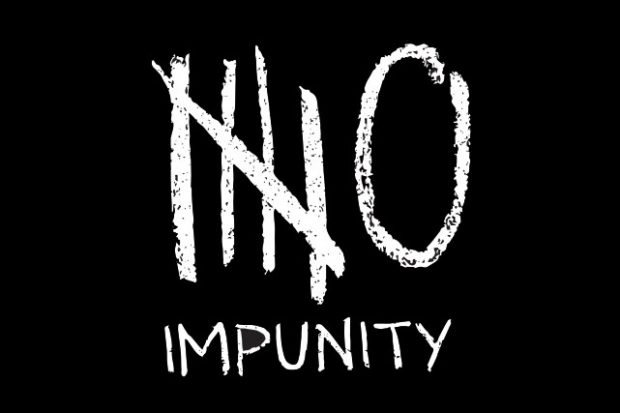
Since 2004, over 700 journalists have been killed for their reporting. Nine out of 10 of these cases go unpunished.
Index on Censorship’s Mapping Media Freedom platform verified a number of reports of impunity since it began monitoring threats to press freedom across Europe in May 2014. Reporters Without Borders also tracks cases of violence against journalists in its annual press freedom barometer and its end-of-year round-up of journalists killed worldwide.
“The brutal murder of Daphne Caruana Galizia on 16 October is a stark reminder of the dangers journalists face for reporting in the public interest. Pressure must be brought to bear on government officials in all countries to ensure that crimes against journalists do not go unpunished,” Hannah Machlin, project manager for Mapping Media Freedom, said.
Impunity, which is defined as the exemption from punishment or paying reparation for a crime, goes hand-in-hand with authorities’ inaction when investigating both violent and nonviolent actions against journalists.
“Violence against journalists and impunity for their attackers has become all too common in many parts of the world, and alarmingly, is on the rise in Europe, particularly in cases of journalists investigating corruption. We reiterate our call for the creation of a UN Special Representative for the Safety of Journalists to address this vicious cycle”, said Rebecca Vincent, UK Bureau Director for Reporters Without Borders.
To condemn such crimes, increase accountability and defend the rights of media professionals, the United Nations General Assembly proclaimed 2 November as the ‘International Day to End Impunity for Crimes Against Journalists’ in 2013. It has since been observed to raise awareness of impunity and condemn violence against the media.
AZERBAIJAN
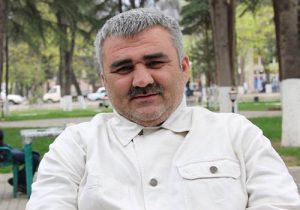
Azerbaijani journalist Afgan Mukhtarli
On 29 May 2017, investigative journalist and government critic Afgan Mukhtarli disappeared on his way home in Tbilisi, Georgia. Mukhtarli reappeared the next day across the border in Azerbaijan and was accused of illegal border crossing, resisting police and smuggling when police allegedly found €12,000 on his person. He was immediately sentenced to three months in pre-trial detention.
This case is unique in that it is the first cross-border operation alleged to be accompanied by the Georgian government. Azerbaijani lawmaker and a member of the Parliament Human Rights Committee Elman Nasirov claimed Mukhtarli’s kidnapping was “the most successful operation carried out in recent years”. Nasirov also accused him of being a member of a broader anti-Azerbaijan network. As a preventive mechanism, Nasirov claimed that Azerbaijani special forces made necessary arrangements with Georgian special forces.
Police have questioned political activists, members of opposition parties, and journalists as part of the investigation. Sevinc Vagifqizi, a freelance reporter, was detained while waiting outside the state border services where Mukhtarli was being held. Other journalists who have been questioned in the case of Mukhtarli are investigative journalist Khadija Ismayilova, who is facing a travel ban despite her release from jail, and more recently, Aytac Ahmadova.
The circumstances of Mukhtarli’s arrest were also notable for the suspicious injuries he sustained. Outside of his abduction, Mukhtarli’s lawyer reported that he had suffered a broken nose, multiple bruises and a possible broken rib.
BELARUS
On 12 March 2017, Adarya Hushtyn, the editor for BelaPAN news agency, arrived from Minsk to the town of Orsha in the Vitsebsk region of Belarus to cover a protest against the tax on the unemployed which was to be held in the early afternoon.
When she arrived that morning, she was stopped at the railway station by the commander of the riot police squad to check her documents and press card. She was then detained by police officers together with Nasha Niva newspaper correspondent Siarhei Hoodzilin who had arrived to cover the same protest.
At the police station, both journalists were searched and informed that they were being checked for in the database of wanted people. Hushtyn was detained at the police station for nearly three hours without any explanation. She was only released after the protest she intended to report on was over.
Hushtyn filed a complaint against her illegal detention and was told that she was mistaken for another woman who was also wanted by the police. As it turned out, this woman was not only unlike the journalist but was found two weeks prior to Hushtyn’s detention. She also filed an application to the prosecutor’s office to initiate a criminal case under Article 198 of the Criminal Code of the Republic of Belarus “preventing from lawful professional activity of a journalist”, but was refused.
In March 2017, the Belarusian Association of Journalists (BAJ) made an appeal to the Minister of Home Affairs calling on the authorities to investigative the mass violations of journalists’ rights. The reply was that police officers did not violate any law and that BAJ “has to stop ‘covering up’ and ‘justifying’ the people who have nothing to do with mass media”.
In March alone, 94 reporters were detained and 6 were beaten by the police while covering nationwide protests.
CZECH REPUBLIC
In April 1992, Václav Dvořák was shot and killed in front of his home. Dvořák was a journalist who uncovered information regarding František Mrázek, a controversial Czech entrepreneur once believed to be the boss of the Czech mob. Dvořák both published his reports locally or passed them along to national distributors. There are thirteen other murders thought to be linked to Dvořák’s.
After more than fourteen years, police identified Dvořák’s killer as gangster Bohuslav Hájek, who is believed to have been ordered by Mrázek to carry out the murder. However, Hájek disappeared in 2001 and it is believed that he was also murdered as an inconvenience and a witness to Mrázek’s operations.
GERMANY
On 6 July 2017 in Hamburg, Germany, police assaulted a number of journalists at the G20 protests.
Of the 35 investigations launched, 27 are accusations of assault perpetrated by police officers. At this time, none of the attackers have been arrested or convicted.
“There has been no police brutality,” Olaf Scholz, the mayor of Hamburg, claimed days after the protests during a televised interview.
On 8 July 32 journalists had their accreditation revoked by federal police without explicit reasoning. This launched an investigation by federal police, who discovered police files against the journalists contained incorrect information. Although there were errors made in police documents, it is unclear if the journalists have regained accreditation.
Journalists who lost accreditations include photographer Björn Kietzmann, Rafael Heygster (Weser Kurier), photographer for Junge Welt, Willi Effenberger Alfred Denzinger (Beobachter News), photographer Chris Grodotzki (Spiegel Online), Adil Yigit (Avrupa Postasi), editor Elsa Koester (Neues Deutschland) and freelance photographer Po Ming Cheung.
HUNGARY
On 15 July 2016 investigative journalist Csaba Móricz was insulted and then chased by the mayor of Érpatak, Orosz Mihály Zoltán, in a car. Earlier that day, Móricz went to Érpatak to document a city council meeting where he expected to ask questions to the mayor regarding a series of financial irregularities that he had uncovered.
At the beginning of the council meeting, instead of opening, the mayor launched into a fifteen-minute speech about the journalist, declaring him a “media rat” and “secret agent” several times, insinuating that Móricz lied about the financial situation in Érpatak for money. Two men then entered the room, one of which was Richárd Fügedi, a councillor of the far-right party Jobbik. One of the men then started threatening the journalist and asked: “Are you going to push me, Mr Móricz?“
The journalist left and drove away from the meeting, but soon realised that his vehicle was being followed by a group of three other cars – two of which belonged to the mayor‘s office. All cars involved were driving above the speed limit towards a nearby town when the journalist noticed a police patrol and decided to stop and ask for protection.
The police officers, instead of protecting the journalist, checked Móricz’s ID in the midst of a group of five people, including Mayor Zoltán and a second Jobbik MP. The group filmed the incident despite the journalist requesting they stop when his personal details, including his home address, were read aloud. Móricz had to insist to the police officers that they escort him to safety after initially being refused.
Just one month later, the authorities have opened an investigation against Móricz for breaking the speed limit. The investigation began when the website he works for wrote that he had to speed up to 140-150 km/h to escape his followers.
ITALY
Cosimo Cristina was born in Termini Imerese, an industrial village not far from Palermo, in 1935. He started working in the local newspaper L’Ora di Palermo when he was twenty. Later, he became a freelance contributor for several national newspapers and for the ANSA news agency.
In the late 1950’s, Cristina started to collect information about the clans of the Cosa Nostra, or the Sicilian mafia, in Palermo and Termini Imerese. In 1959 he published a new magazine titled “Prospettive Siciliane” (Sicilian Perspectives) with his friend Giovanni Capuzzo to cover stories on the mafia. This is when he started receiving death threats.
On 3 March 1960, he did not return home from work. Two days later, his corpse was discovered near to the railway, his skull broken. In his pockets he carried an ID and two letters; one for his fiancé and one for Capuzzo. In these letters Cristina begged for forgiveness for taking his own life. For the police it was a suicide and the case was closed. There was no further investigation or handwriting analysis on the letters found at the scene.
Five years later, police officer and expert on the Sicilian mafia Angelo Mangano began a new investigation. He knew Cristina had written several articles probing into the world of the Cosa Nostra. Mangano requested an autopsy on the corpse but the results confirmed the suicide, despite the doubts.
MALTA
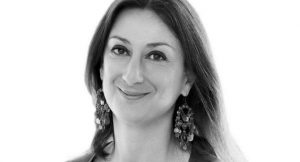
Daphne Caruana Galizia
On 16 October at around 3pm, Daphne Caruana Galizia was killed when the car she was driving exploded in Bidnija in what is thought to have been a targeted attack. Galizia filed a police report 14 days prior saying that she was being threatened.
“The barbaric murder of Daphne Caruana Galizia is an attack on journalism itself. This crime is meant to intimidate every investigative journalist,” said Dr Lutz Kinkel, managing director of the European Centre for Press and Media Freedom.
“Because prime minister Joseph Muscat and parts of Malta’s political elite were targets of Galizia’s disclosures, we strongly recommend an independent investigation of this case. The killers have to be found and put on trial.”
On 17 October, Galizia’s family filed an application to Magistrate Consuelo Scerri Herrera to abstain from investigating the case because of the court’s “flagrant conflict of interest”. Galizia and the magistrate share a history of conflict and critique.
Galizia has conducted numerous high profile corruption investigations and has been subject to dozens of libel suits and constant harassment. Because of her research, in February, her bank assets were frozen following a request filed by the economic minister.
Galizia has made numerous opponents in the Maltese government and business world and has investigated and linked such high officials as opposition leader Adrian Deliato offshore accounts and alleged prostitution, real estate investment owner Silvio Debono to public land takeover and Prime Minister Joseph Muscat and his wife to hiding payments from Azerbaijan.
London: Vigil for Daphne Caruana Galizia
Join us to mark the International Day to End Impunity for Crimes Against Journalists by joining a vigil mourning the death of Maltese investigative journalist Daphne Caruana Galizia, who was murdered on Monday 16 October.
When: Thursday 2 November 1-2pm
Where: Malta High Commission, Malta House, 36-38 Piccadilly, Mayfair, London W1J 0LE (Map)
MONTENEGRO
On 1 November 2007 Tufik Softic, a Montenegrin journalist and reporter for the opposition daily newspaper Vijesti, was brutally beaten in front of his home in Berane by two hooded assailants wielding baseball bats. About six years later in August 2013, an explosive device was thrown into the yard of Softic’s family home. It was not until 2014 and broad international pressure on Montenegro that both cases began formally investigating.
On 17 July 2014, police arrested two men in the town of Budva under the suspicion of involvement in the attacks against Softic. After questioning by the state prosecutor, who also confiscated their passports, the men were released on the same day.
Ten years after the initial attack in February 2017, Softic filed a lawsuit against the state for ineffective investigation. The lawsuit claims that the state is responsible for mental pain and fear which Softic suffered and will suffer because of the danger of re-attack, the Trade Union of Media of Montenegro reported. The state, TUMM continued, “encouraged attackers by ineffective investigation and eventually, its ending”.
After years of stalemate, Softc initiated the trial for compensation for non-pecuniary damage related to human rights violations. He has since been awarded €7,000 as compensation for the ineffectual investigation and mental suffering he endured, becoming the first in Montenegro’s history to do so. Softic’s case is emblematic of the atmosphere of impunity in Montenegro and the broader Balkan region.
RUSSIA
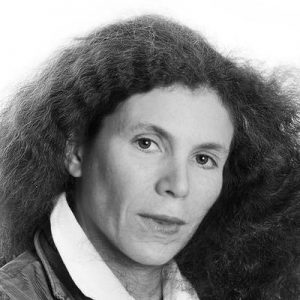
Yulia Latynina (Twitter)
After multiple life-threatening attacks, Yulia Latynina fled Russia. The columnist, contributor and writer works for independent newspaper Novaya Gazeta, as well as radio station Echo Moskvy.
“I have left Russia in connection with threats to my life,” Latynina wrote on Twitter on 10 September. A week before on 3 September, her car was set on fire and completely destroyed. On July 2017 the journalist’s car and parent’s house were sprayed with noxious gas which led to the poisoning of eight people in the surrounding area. In a third incident on August 2016, faeces were poured onto Latynina while she was on her way to work at Echo Moskvy station.
In all three cases, a proper investigation was not carried out and the perpetrators were not found.
Also in Russia, on 9 March 2016, an attack was made on a minibus carrying journalists and human rights activists, near the border between Ingushetia and Chechnya. After no suspects had been identified, the investigation was suspended in February 2017. Although Ingushetia resumed the investigation after a public backlash, no progress has been made.
SERBIA
Three controversial murder cases from the nineties and early 2000’s remain unresolved in Serbia, with the most well-known case being the murder of journalist and newspaper publisher Slavko Ćuruvija outside of his apartment in Belgrade in 1999. It is believed that the order came from senior secret service officials during the regime of strongman Slobodan Milošević. Four former state security officials have been on trial for the murder as of December 2014, which continues to progress slowly. The lack of closure to the case after nearly two decades shows the perpetuation of state impunity in Serbia even after regime change.
The suspicious death of journalist Dada Vujasinović in 1994 also remains unsolved. Vujasinović is believed to have been murdered because of her published articles regarding war criminal Željko Ražnatović, better known as Arkan. She was found dead in her apartment in 1994. The police ruled it a suicide and nobody has been arrested or prosecuted to this day.
The third case is that of Večernje Novosti journalist Milan Pantić, who was murdered in 2001. He reported on criminal affairs and official corruption. As of June 2017, the police investigation had finally been completed and suspects have been identified, awaiting a trial. All three of these cases are being investigated by an independent commission established in 2013.
UKRAINE
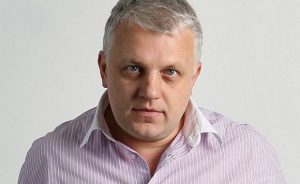
Pavel Sheremet (Photo: Ukrainska Pravda)
Journalist Pavel Sheremet‘s killing in a car bombing in Ukraine’s capital city on July 20, 2016, cast a chill over the country’s press corps, and the ongoing impunity for those behind the crime has continued to affect journalists’ ability to cover sensitive subjects.
Sheremet was killed when the car he was driving exploded in Kyiv. In a statement, Ukrainian police said that an explosive device detonated at 7.45am as Sheremet was driving to host a morning programme on Radio Vesti, where he had been working since 2015.
The car belonged to Sheremet’s partner, journalist Olena Prytula, who co-founded Ukrainska Pravda with murdered journalist Georgiy Gongadze.
Sheremet had been imprisoned by Belarusian authorities in 1997 for three months before being deported to Russia. Though stripped of his citizenship in 2010, he continued to report on Belarus on his personal website. He moved to the Ukrainian capital in 2011 to work for the newspaper Ukrainska Pravda.
There have been no arrests in the journalist’s murder.[/vc_column_text][/vc_column][/vc_row][vc_row][vc_column][vc_row_inner][vc_column_inner width=”1/2″][vc_single_image image=”80577″ img_size=”full” onclick=”custom_link” link=”https://www.balcanicaucaso.org/bloc-notes/Impunita-dei-crimini-contro-i-giornalisti-una-scelta-politica”][/vc_column_inner][vc_column_inner width=”1/2″][vc_column_text]
696 è il numero esatto di professionisti dell’informazione uccisi dal 2007 ad oggi nel mondo, secondo i dati raccolti dal Comitato per la Protezione dei Giornalisti (CPJ).[/vc_column_text][/vc_column_inner][/vc_row_inner][vc_row_inner][vc_column_inner width=”1/2″][vc_single_image image=”96211″ img_size=”full” onclick=”custom_link” link=”https://www.indexoncensorship.org/2017/10/targeting-journalists-name-national-security/”][/vc_column_inner][vc_column_inner width=”1/2″][vc_column_text]
As security – rather than the protection of fundamental rights and freedoms – becomes the number one priority of governments worldwide, broadly-written security laws have been twisted to silence journalists.[/vc_column_text][/vc_column_inner][/vc_row_inner][vc_row_inner][vc_column_inner width=”1/2″][vc_single_image image=”96229″ img_size=”full” onclick=”custom_link” link=”https://www.indexoncensorship.org/2017/10/turkish-injustice-scores-journalists-rights-defenders-go-trial/”][/vc_column_inner][vc_column_inner width=”1/2″][vc_column_text]
About 90 journalists, writers and human rights defenders will appear before courts in the coming days[/vc_column_text][/vc_column_inner][/vc_row_inner][vc_row_inner][vc_column_inner width=”1/2″][vc_single_image image=”96183″ img_size=”full” onclick=”custom_link” link=”https://www.indexoncensorship.org/2017/10/interpol-the-abuse-red-notices-is-bad-news-for-critical-journalists/”][/vc_column_inner][vc_column_inner width=”1/2″][vc_column_text]
Since August, at least six journalists have been targeted across Europe by international arrest warrants issued by Turkey, Azerbaijan, Uzbekistan and Kazakhstan[/vc_column_text][/vc_column_inner][/vc_row_inner][vc_custom_heading text=”Mapping Media Freedom” use_theme_fonts=”yes”][vc_separator color=”black”][vc_row_inner][vc_column_inner width=”1/4″][vc_icon icon_fontawesome=”fa fa-times-circle” color=”black” background_style=”rounded” size=”xl” align=”right”][/vc_column_inner][vc_column_inner width=”3/4″][vc_column_text]
Since 24 May 2014, Mapping Media Freedom’s team of correspondents and partners have recorded and verified over 3,600 violations against journalists and media outlets.
Index campaigns to protect journalists and media freedom. You can help us by submitting reports to Mapping Media Freedom.[/vc_column_text][/vc_column_inner][/vc_row_inner][/vc_column][/vc_row][vc_row][vc_column][vc_custom_heading text=”Don’t lose your voice. Stay informed.” use_theme_fonts=”yes”][vc_separator color=”black”][vc_row_inner][vc_column_inner width=”1/2″][vc_column_text]Index on Censorship is a nonprofit that campaigns for and defends free expression worldwide. We publish work by censored writers and artists, promote debate, and monitor threats to free speech. We believe that everyone should be free to express themselves without fear of harm or persecution – no matter what their views.
Join our mailing list (or follow us on Twitter or Facebook) and we’ll send you our weekly newsletter about our activities defending free speech. We won’t share your personal information with anyone outside Index.[/vc_column_text][/vc_column_inner][vc_column_inner width=”1/2″][gravityform id=”20″ title=”false” description=”false” ajax=”false”][/vc_column_inner][/vc_row_inner][vc_separator color=”black”][/vc_column][/vc_row]








